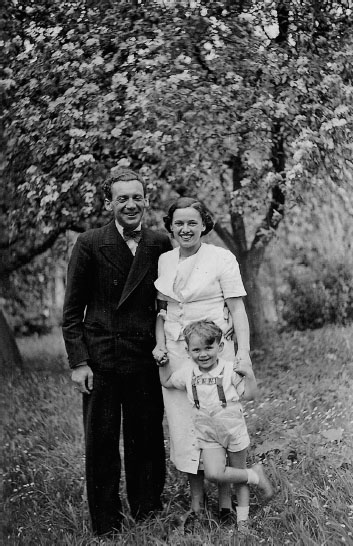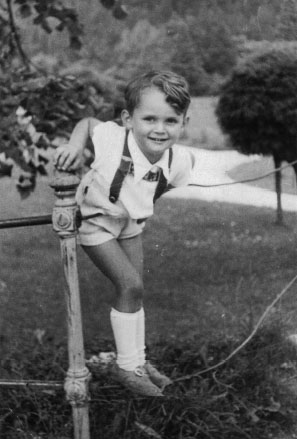A Lucky Child: A Memoir of Surviving Auschwitz as a Young Boy (3 page)
Read A Lucky Child: A Memoir of Surviving Auschwitz as a Young Boy Online
Authors: Thomas Buergenthal,Elie Wiesel
Tags: #Biography & Autobiography, #General, #United States, #Biography, #Social Science, #Personal Memoirs, #Europe, #History, #Historical, #Military, #World War II, #World War; 1939-1945, #Holocaust, #Jewish Studies, #Eastern, #Poland, #Holocaust survivors, #Jewish children in the Holocaust, #Buergenthal; Thomas - Childhood and youth, #Auschwitz (Concentration camp), #Holocaust survivors - United States, #Jewish children in the Holocaust - Poland, #World War; 1939-1945 - Prisoners and prisons; German, #Prisoners and prisons; German


Thomas with his parents, May 1937
As I search my memory for some aspects of my brief life in Lubochna, I have a hard time separating what my parents told me
from what I actually remember. My guess is that much of what I think I remember from that period I actually heard later from
either my father or my mother. My mother frequently recalled that at the age of three or four I served as her interpreter
when she went shopping in Slovakia. She spoke only German and the shopkeepers for the most part only Slovak. I could apparently
get along in both languages. We spoke German at home when the three of us were together, and I must have picked up Slovak
from my Slovak nannies.
My only clear recollection of life in Lubochna dates back to a day in late 1938 or early 1939 when my parents told me that
we had to leave our hotel. As they began to pack our belongings, they appeared to be very much in a hurry. Years later, I
was told that the Hlinka Guard, a Slovak fascist party supported by Nazi Germany that controlled Slovakia, had claimed to
have had a court order declaring a group close to it the owner of our hotel (my parents had purchased Erich Godal’s share
in the hotel some years earlier). There was no way to successfully challenge this confiscation of our hotel. By that time,
the Hlinka Guard and its followers controlled the courts, and their police threatened to expel us from the country if we resisted
their takeover or failed to leave Lubochna immediately.

Thomas leaning on a fence, Czechoslovakia, 1937
As a result, we could take only a few suitcases with us, leaving everything else, in addition to the hotel itself, to the
new “owners.” But I wanted my car to come with us! It was a little red car with pedals. I was told I could not take it along
but that we would soon be back and that it would be waiting for me on our return. That car was my most treasured possession.
I must have sensed that I would never see it again, for I went to the storeroom to look for it. There it was, propped up on
its rear wheels, leaning against a post, surrounded by boxes and suitcases. It looked as sad as I felt. To this day, when
I think back to that moment, I can still see my little red car.
After leaving Lubochna, we lived for a time in Zilina, also in Slovakia. At first, we stayed with friends who owned the Grand
Hotel in that city. I remember the name because I had a wonderful time standing at its main entrance with one of the doormen
and, as was then the custom, calling out “Grand Hotel!” to passersby. They would frequently engage me in conversation and,
to my delight, sometimes even tossed me a small coin.
From the hotel, we moved to a small apartment in Zilina. Here, my mother and I were often alone. My father had found a job
as a traveling salesman for a medical instrument company and spent a lot of time visiting customers in different parts of
the country. My parents had apparently used most of their savings, including the money my mother had received from her parents
as dowry, to enlarge the hotel in Lubochna and to buy out their former partner. Now the hotel was gone and with it the income
they had depended on.

The red car, Thomas’s favorite toy, 1937
While we lived in Lubochna, Mutti had never had to cook. That was done by the hotel’s chef, a massive and intimidating Slovak
matron, who let my father know in no uncertain terms that his young wife was not welcome in her kitchen. Now, in Zilina, things
were different, and I soon realized that my mother was not a very good cook. Once she roasted a chicken without cleaning its
insides very well. When my father started to eat it, he ended up with a mouthful of corn, which must have been the remains
of the chicken’s last meal. Of course, he spat it all out, and they had a big fight, with my father yelling, “I thought they
taught you something at that finishing school in Göttingen!” She counterattacked by reminding him of some long-forgotten incident
for which he was supposedly to blame. And when he replied that that had nothing to do with her bad cooking, she accused him
of changing the subject. I soon realized that she would always win these arguments, while he would end up shaking his head
in utter disbelief. At times she would also make me her coconspirator when she did something she did not want my father to
know. Once, when she realized that the kitchen rag she had been looking for had fallen into the pot in which she happened
to be cooking, she swore me to secrecy and assured me, “Papa will not notice anything if we don’t tell.”
One day, while my father was out of town, the police came to our apartment and ordered my mother to pack our belongings and
make sure that we would be ready to go with them within the hour. We were Jews and undesirable foreigners, we were told, and
were being expelled from the country. My mother protested that we could not leave without my father but to no avail. We were
taken to the police station. Its building and courtyard were already filled with other foreigners. My mother recognized some
of our friends among them. People were sitting on their suitcases, children were crying, and I sensed that everybody was very
afraid, just as I was.

The Buergenthal family, already on the run — Slovakia, circa 1938
As soon as we arrived at the police station, my mother, in her precise, clipped German, demanded to see the chief of police
or the person in charge. She made a tremendous amount of noise while waving a leather-bound document with a lot of stamps
on it. After a few minutes, we were taken into an office. Here a heavyset man in uniform, who was not very friendly, asked
in a threatening tone of voice what all the commotion was about and who she thought she was. My mother, who seemed very tall
to me at that moment, but who measured slightly less than five feet, slammed her document on the man’s desk and barked at
him in German: “We are Germans!” Pointing to the document on the desk, which she called her passport, she continued in that
same tone: “We are supposed to be your allies! It is an outrage that you are treating us like common criminals.” She immediately
wanted to be taken to the German consul to protest this scandalous treatment, and she warned the police official that he and
his superiors were going to be in very serious trouble from the German authorities for harassing Germans living peacefully
in Slovakia. “Just you wait and see what will happen when my husband comes back and does not find us at home!”
After a whispered conversation with another man and some further inspection of the passport, the officer suddenly smiled at
us, got up from behind his desk, grasped my mother’s hand, and, in broken German, apologized to her profusely. This was all
a big mistake; of course they were not deporting Germans living in Slovakia, only foreign Jews and other undesirables who
should not have been allowed into the country in the first place. He shook my mother’s hand again, saluted, and ordered a
policeman to escort us home.
Years later, I learned that my mother’s “passport” was in fact a German driver’s license, which looked like a passport. Her
German passport had been confiscated when she tried to renew it because, like other Jews living abroad, she had apparently
been stripped of her German citizenship. To this day, I wonder what she would have done had the police officer been able to
read German and called her bluff. The last person she wanted to talk to at that moment was the German consul.
I continue to marvel at the courage, ingenuity, and intelligence my mother demonstrated that day, character traits she was
to reveal many times over in the future, under even more difficult circumstances. Where did this young woman from a well-to-do,
protective, Jewish middle-class home with barely a secondary school education derive the cunning and almost reckless gall to
assess and take advantage of the weakness of those posing a serious threat to her or her family and come out the winner? As
a child, I assumed that it was only natural for my mother to always know what to do. But what was then “natural” has continued
over the years to inspire my profound admiration and to puzzle me, not only because she repeatedly succeeded in beating the
odds when confronting the Nazi killing machine, but also because she seemed to pull off these successes at a moment’s notice
with the speed of a magician. Where did that magic come from? Although I have tried, I have never quite been able to identify
the intellectual and emotional source of my mother’s special gift. All I know is that she had it.
As soon as we had returned to our apartment from the police station, Mutti exclaimed, “We were lucky this time!” But then
she added, “They will be back,” and began looking for my father’s handgun. He had acquired it in Lubochna to scare off foxes
and other animals that sometimes tried to get into the chicken coop behind the hotel’s woodshed. When my mother found the
gun, she told me that we had to throw it away secretly so that the police would not find it the next time they came. She handled
the gun very gingerly, let it slide into a paper bag, and told me not to touch it. The next day, we walked to the river and
threw the gun into the water from one of the bridges. I did not understand it but felt very grown up to be participating in
this highly secret operation. When my father returned, he was very angry to learn that my mother had thrown his gun away,
but it was too late to do anything about it.
A few days later, my parents decided that Slovakia was no longer safe for us and that the time had come to leave. They expected
the harassment of Jews, particularly foreign Jews, to become more severe in that part of Czechoslovakia. My father was also
afraid that he was on a Gestapo “Wanted” list, and if the police were to come back, they might arrest him and turn him over
to the Germans. But where could we go? That was a question I heard my parents discuss over and over again in whispered tones,
usually at night when I was supposed to be asleep. Eventually, they settled on Poland. It was the only country they thought
we might be allowed to enter. There, moreover, my father would be able to obtain the visas that he had been promised by the
British authorities in Czechoslovakia and that would allow us to travel to England as political refugees.
